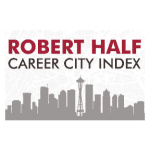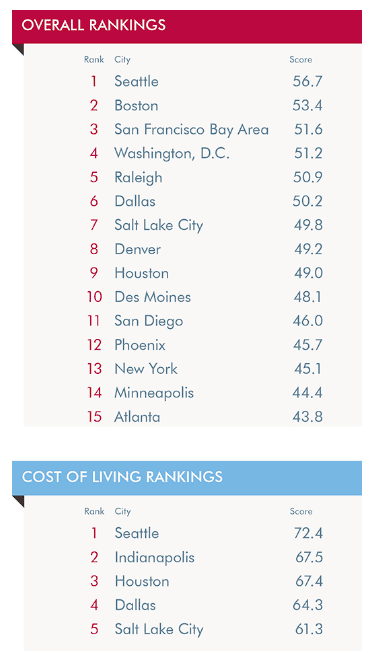 The Robert Half Career City Index, a ranking and comparison of 25 U.S. cities across several indicators selected to measure the different aspects that relate to career development, has joined with The Economist to score the #1 place to work in America. The overall top scorer on the career cross table is (drum roll, please) Seattle.
The Robert Half Career City Index, a ranking and comparison of 25 U.S. cities across several indicators selected to measure the different aspects that relate to career development, has joined with The Economist to score the #1 place to work in America. The overall top scorer on the career cross table is (drum roll, please) Seattle.
Josh Warborg, District President for Robert Half in Seattle explained the methodology:
“We examined key factors influencing livability and career opportunities in various U.S. cities in four categories: career prospects, quality of life, cost of living and cultural diversity. Seattle ranked as the #1 city for professionals which speaks volumes and is a testament to the market’s significant increase both in top talent and local business growth. This is yet another reason why local business owners need to put their best foot forward by positioning their companies as a great place to work,” he advised.
The “Intelligence Unit” research team of The Economist created the Index framework, selected the final set of indicators, gathered internal and external data, analyzed and scored the data, and built the Index.
Some of the standout findings of the research:
• 59% of Seattle residents age 25 and older have a Bachelor’s degree or higher, the most of all cities surveyed.
• Seattle ranked first in Cost of Living Rankings indicating that, at the time of the survey, a bag of groceries cost less here than in the other cities measured. Rents were also lower (the more recent development boom could be a variable for this metric!)
• While Seattle was ranked the #1 city overall in Overall Career City attributes and #2 as a city with the best Career Prospects, an anomaly in the survey found that the E-City was last on the list in Quality of Life. This particular metric compared cities based on the number of sunny days, the rate of rental vacancies, and the quality of health care.
While we would concede the first two data points (especially this year’s cloudy weather), we can’t comprehend the third, not with healthcare leaders like UW Medicine, the Fred Hutchinson Cancer Research Center, Swedish, Providence, Virginia Mason, Group Heath (now Kaiser Permanante), and the list goes on — not to mention our leadership in genomic immunotherapy and life sciences.

While Seattle may not be a hard sell for the major employers, Josh emphasized that the skyrocketing demand for top talent means that small to mid-size companies, need to promote this kind of research to “brand” their employment opportunities.
“Seattle is the hub for many large companies such as Amazon and Microsoft. Local small to midsize businesses have distinct advantage to emphasize to employees that by working for them, they become family, add personal value, have a great opportunity for professional growth with the personal attention that is unique to the small & midsize business structure.”
“Small and midsize business owners should identify the reasons why their company is a great place to work by asking current employees about what makes them happy at work. Also, research what the local competitors have to offer. Companies need to move quickly when hiring and consider working with a recruiter who can help identify top professionals in their market,” Warborg said. [24×7]




















